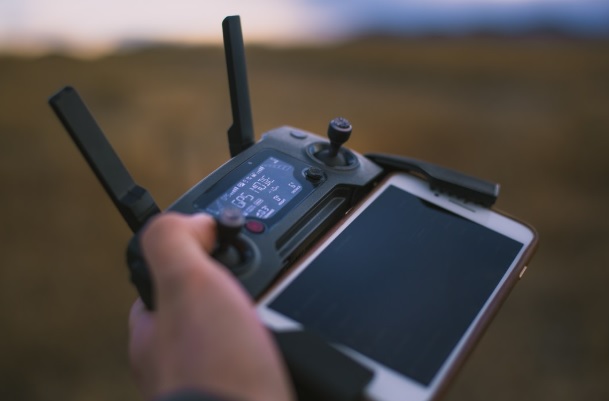
Everything we use today uses WiFi to connect to each other, even your fridge. Drones also use WiFi in order to do a lot of their functions—including to fly? I did some research and here’s what I found.
Not all drones require WiFi to fly. In fact, a lot of the top drone manufacturers have dedicated apps to allow pilots to fly their drones without it. Some of the best drones that don’t need WiFi to fly are:
| Name: | Flight Time: | Range: | Camera Quality: | Price: | View More Link: | |
| 1. | DJI Mavic 2 Zoom | 31 min | 11 miles | 20MP | $1,439 | VIEW |
| 2. | Yuneec Typhoon H | 25 min | 1 mile | 4K | $1,199 | VIEW |
| 3. | DJI Mavic Air | 21 min | 2.4 miles | 4K | $740 | VIEW |
| 4. | Yuneec Mantis G | 33 min | 1,2 miles | 4K | $700 | VIEW |
| 5. | DJI Inspire 2 | 27 min | 4.3 miles | 5.2K | $3,500 | VIEW |
Now that you know which drones are the top picks when it comes to flying without WiFi, keep reading to see a detailed breakdown of each drone and what it can do!
01. DJI Mavic 2 Zoom
The DJI Mavic 2 Zoom is the leading prosumer drone on the market. Released at the same time as its counterpart, the Mavic 2, the zoom is different because of its optical zoom lens.
Flight time. With a flight time of 31 minutes and a range of 11 miles, you can be sure that you will have amazing experiences with this drone.
Sensors. The Mavic 2 has a 1-inch sensor that offers better image quality with superior light and color performance than ever before.
Camera Quality. DJI worked together with Hasselblad in order to fit a unique camera to this drone with magnificent 20-megapixel quality. This new and improved camera lets you take detailed aerial photos.
The Zoom is all about perspective and has a 2X optical zoom lens that allows the drone pilot to shoot footage with greater efficiency and safety while still offering more opportunities to shoot amazing footage.
02. Yuneec Typhoon H
The Typhoon H is a 6 rotor multicopter or UAV(Unmanned Aerial Vehicle) that was made by Yuneec who is a big name in the drone industry.
The Typhoon H was introduced because of the need for a drone design that allows it to go beyond the general limitations of the traditional quadcopter.
Camera Quality. This drone allows for a 360-degree view of the world with the 3-axis anti-vibration CGO3+ gimbal camera that is able to capture ultra-stable 4K high definition video.
Controller. The Typhoon H uses the ST16 Ground Station controller. This controller features a reciever, transmitter and uses an Android platform that gives the drones pilot full control over the Typhoon H.
This drone allows you to use the Yuneec Skyview FPV headset for a virtual reality experience you will want to keep experiencing.
03. DJI Mavic Air
The DJI Mavic Air is viewed by many as a marvel in engineering and design as it incorporates the best features of the Mavic series of drones into a tiny frame perfect for travel to wherever your droning adventure might take you.
Design. The Mavic Air is ultraportable and foldable, featuring high-end performance and functionality. The 3-directional environmental sensing tech in the drone makes it safer to fly as well.
Flight time. Even though the DJI Mavic Air is a small drone it still gives larger drones a run for their money when it comes to flight time, boasting a 21 minute maximum flight time, you will have plenty of time in the air to enjoy every feature this drone has.
Storage Space. In addition to the SD card slot, the drone also has 8 gigabytes of internal storage.
04. Yuneec Mantis G
If you are looking for a brilliant drone to take your vacation photos to the next level or your day out with family and friends, then there really is no other reason to look further than the Yuneec Mantis G.
Camera Quality. With a full HD camera and 4K resolution, you can produce smooth video and take sharp photos. The Mantis G allows you to fly for 30 solid minutes of uninterrupted flight.
Extended Voice Control. One unique feature the Mantis G has that a lot of drones do not have is the ability for the drone pilot to control the drone using their voice with the Extended Voice Control feature.
You can even go beyond just asking the Mantis to simply take off, you can even control the drone while it is in the sky as well as asking it to “Start recording” and “Come back”. It doesn’t even matter if you are saying this in English, German or French, the Mantis will always be listening to your cues.
05. DJI Inspire 2
The DJI Inspire 2 is a cut above the rest. Being a film making drone it has been designed to carry high quality 4K camera equipment that and a HD video tranmission system.
The Inspire 2 has a 360-degree rotating gimbal that makes sure that you do not miss out on any camera angles.
Camera Quality. If you are or planning to shoot any high-quality video with a drone and don’t mind parting with a few extra dollars then you should definitely look into owning the Inspire 2.
Battery. The Inspire 2 has a dual battery system that prolongs its maximum flight time to 27 minutes.
Now, this might not seem like much considering some of the other drones on this list have longer flight times with only one battery but what you need to remember is that drones used on the sets of films are usually required to carry a lot of weight in the form of camera equipment.
Being bigger they need larger propellers and larger propellers mean they need larger motors to be able to turn them and that is why these drones usually don’t last very long in the air.
The Inspire 2 however allows for 27 minutes with its dual battery carrying ability which is not a small feat.
Lightbridge. The Inspire 2 does not need WiFi to fly as the controller uses Lightbridge technology which allows for signal frequency switching between 2.4GHz and 5.8 GHz.
How do Drones Communicate Without WiFi?
Now that we know that drones actually don’t need WiFi for you to be able to fly them and that there are actually quite a few drones out there that don’t need WiFi to stay in the air, how do drones fly without it?
A lot of the top drone companies like DJI and Yuneec do need WiFi to be able to pilot or record video. They do however need you to download an app before flying.
When the app is downloaded on to your device and the drone is activated, an internet connection will no longer be required.
The controller is what is used to communicate with the drone. To control the drone, a signal is sent from the remote controller all the way to the drone itself.
The digital pulse or signal sent to the drone from the controller tells the drone what direction you want to go or how much throttle and roll you want.
The flight controller transforms these signals that have been sent into control signals. Generally, the strength and frequency of the radio signals are regulated by law.
Different frequencies are reserved for important organizations like the police and various frequencies are reserved for the use of the public to control their RC models such as drones.
The industrial, scientific, and medical (ISM) radio bands are the most commonly used frequency ranges.
Some drones, usually used by children and are in the toy class of drones, use Bluetooth in order to transmit data. When it comes to Bluetooth data transmission the range is not very large and that is why this is usually only in toy drones.
Another thing that makes Bluetooth an undesirable method of transmitting data signals for drones is that the signal from WiFi and microwave ovens can cause interference which is not an ideal situation.
While WiFi may seem as important as the oxygen we breathe nowadays, it’s interesting to know that we can in fact fly our drones without it with other cool methods!
